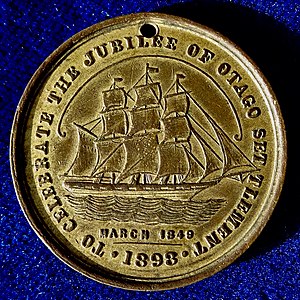
The provinces of the Colony of New Zealand existed as a form of sub-national government. Initially established in 1846 when New Zealand was a Crown colony without responsible government, two provinces were established. Each province had its own legislative council and Governor. With the passing of the New Zealand Constitution Act 1852 the provinces were recreated around the six planned settlements or "colonies". By 1873 the number of provinces had increased to nine, but they had become less isolated from each other and demands for centralised government arose. In 1875 the New Zealand Parliament decided to abolish the provincial governments, and they came to an end in November 1876. They were superseded by counties, which were later replaced by territorial authorities.

Otago Harbour is the natural harbour of Dunedin, New Zealand, consisting of a long, much-indented stretch of generally navigable water separating the Otago Peninsula from the mainland. They join at its southwest end, 21 km (13 mi) from the harbour mouth. It is home to Dunedin's two port facilities, Port Chalmers and at Dunedin's wharf. The harbour has been of significant economic importance for approximately 700 years, as a sheltered harbour and fishery, then deep water port.

Dunedin is the second-largest city in the South Island of New Zealand, and the principal city of the Otago region. Its name comes from Dùn Èideann, the Scottish Gaelic name for Edinburgh, the capital of Scotland. The city has a rich Scottish, Chinese and Māori heritage.

John Cargill was a New Zealand politician and runholder.

Port Chalmers is a town serving as the main port of the city of Dunedin, New Zealand. Port Chalmers lies ten kilometres inside Otago Harbour, some 15 kilometres northeast of Dunedin's city centre.

Quarantine Island / Kamau Taurua is the largest island in Otago Harbour, close to the city of Dunedin, New Zealand. The island covers an area of 15 hectares, and is a publicly accessible recreation reserve. The buildings on the island are owned by Quarantine Island / Kamau Taurua Community Incorporated (QIKTC). Its management is shared between QIKTC and the Department of Conservation.

William Walter Cargill was the founder of the Otago settlement in New Zealand, after serving as an officer in the British Army. He was a member of parliament and Otago's first Superintendent.

The Port Chalmers Branch was the first railway line built in Otago, New Zealand, and linked the region's major city of Dunedin with the port in Port Chalmers. The line is still operational today.

Thomas Burns was a prominent early European settler and religious leader of the province of Otago in New Zealand.

Holy Trinity Church is an Anglican church in Port Chalmers, New Zealand. The church building is constructed in volcanic stone and has some fine stained glass, and is listed as a Category I Historic Place. Together with St Barnabas Church, Warrington, Holy Trinity Church is part of the Port Chalmers-Warrington Parish of the Anglican Diocese of Dunedin, New Zealand.
The following lists events that happened during 1848 in New Zealand.

Victory Beach is located on the Pacific Ocean coast of the Otago Peninsula, in the South Island of New Zealand, 24 kilometres (15 mi) by road from Dunedin city centre and 7 kilometres (4.3 mi) from the nearby town of Portobello. The longest beach on the peninsula, Victory Beach is located northeast of the entrance to Papanui Inlet and stretches for 3.2 kilometres (2.0 mi). The beach's name derives from the wreck of the SS Victory on the beach in 1861.
George Hepburn was a 19th-century Member of Parliament from Otago, New Zealand. Born in Scotland he emigrated to New Zealand in 1850. He first entered politics by serving on the Provincial Council of Otago from 1855 to 1865 before he was elected to the New Zealand House of Representatives as member for Roslyn in 1866.
Philip Laing is a 19th-century sailing ship best known as the second immigrant ship to arrive in Dunedin, New Zealand, on 15 April 1848. Chartered by the New Zealand Company for this voyage the ship was carrying Scottish settlers, under the charge of the Rev. Dr. Thomas Burns.
Victory was built by Fenwick & Co, Sunderland in 1847 and owned by Willis, Gunn and Co and later owned by Wilson and Cook. She was a 578- or 579-ton barque that brought some of the first immigrants from England to Dunedin in July 1848. She also called at Wellington, New Zealand, in August 1848. There was an advertisement that gave her weight as 700 tons, but, given that her captain in 1851 was Mullens, it was unlikely to be another ship.
The Otago Association was founded in 1845 by adherents of the Free Church of Scotland with the purpose of establishing a colony of like-minded Scots in Otago in the South Island of New Zealand, chiefly at Dunedin.
Matoaka was a 1092-ton wooden New Brunswick full-rigged ship built in 1853 for Willis, Gunn, & Co. She was sold to Shaw, Savill, & Albion by 1859. Between 1859 and 1869 she made eight voyages to New Zealand. Her fastest run from Bristol to Lyttelton, New Zealand was 82 days in 1862. On 13 May 1869 she left Lyttelton for London under Captain Alfred Stevens with 45 passengers and 32 crew but was never seen again. In 1865 she was classed as 1322 tons.
The City of Dunedin was a 327-ton side wheel paddle steamer wrecked in Cook Strait near Cape Terawhiti on 20 May 1865 while sailing from Wellington to Hokitika via Nelson with the loss of all on board. Captain James Parker Boyd commanded her.
Isabella Anderson was a New Zealand pioneer. She gave birth to the first Pakeha child born in Dunedin.
The wreck of the three-masted ship Surat was a major event in the early history of New Zealand's Otago Region, occurring on New Year's Day 1874.










